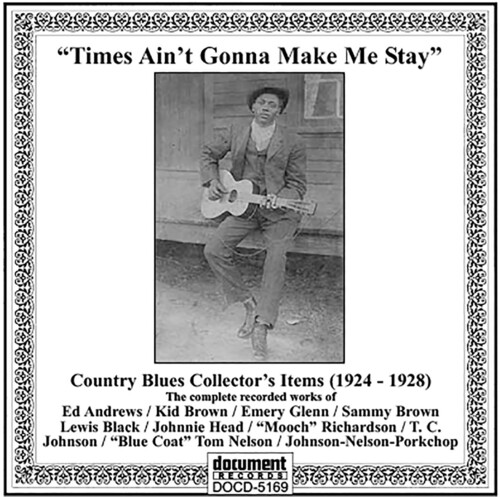Show results for
Explore
In Stock
Artists
Actors
Authors
Format
Theme
Category
Genre
Rated
Label
Specialty
Decades
Size
Color
Deals
- 4K Ultra HD Sale
- Action Sale
- Alternative Rock Sale
- Anime sale
- Award Winners Sale
- Bear Family Sale
- Blu ray Sale
- Blu ray Special Editions
- Blues on Sale
- British Sale
- Classical Music Sale
- Comedy Music Sale
- Comedy Sale
- Country Sale
- Criterion Sale
- Electronic Music sale
- Hard Rock and Metal Sale
- Horror Sci fi Sale
- Kids and Family Sale
- Metal Sale
- Music Video Sale
- Musicals on Sale
- Mystery Sale
- Naxos Label Sale
- Page to Screen Sale
- Rap and Hip Hop Sale
- Reggae Sale
- Rock
- Rock and Pop Sale
- Rock Legends
- Soul Music Sale
- TV Sale
- Vinyl on Sale
- War Films and Westerns on Sale

1924-28-Country Blues Collecto
- Artist: BLUES: COUNTRY BLUES / VARIOUS
- Format: CD
- Release Date: 6/2/1994

1924-28-Country Blues Collecto
- Artist: BLUES: COUNTRY BLUES / VARIOUS
- Format: CD
- Release Date: 6/2/1994
- Label: Document
- UPC: 714298516920
- Item #: ALE851692
- Genre: Blues
- Release Date: 6/2/1994
- This product is a special order
Product Notes
Looking at the chronological history of recorded country blues, the two sides, included here by Ed Andrews, certainly qualify as the first. Recorded in Atlanta, Andrews plays a twelve-string guitar with his strumming technique, interspersed with short bass runs and simple vocal style marking him as an early blues practitioner. Virtually nothing is known of Kid Brown. 'Bo-Lita', a mid-tempo blues, with accompaniment probably by Troy C. Snapp on piano, was recorded for the short-lived Black Patti label in 1927. Though recorded in Atlanta and accompanying himself on the twelve-string guitar, much of Emery Glen's guitar style is reminiscent of some of the Memphis players. On 'Two Ways To Texas' the melodic riffs bring to mind, Furry Lewis. Two distinctively different sides by Sammy Brown make him a stylistic non-entity. On 'Barrel House Blues' his vocal performance is accompanied by an unknown guitarist and has much of the feeling of the more primitive country blues of the time, whereas 'The Jockey Blues', with probably Cripple Clarence Lofton on piano, is typical of urbanized blues. Brown seems more comfortable in the latter piece and lyrically it is a unique work. Lewis Black's recordings are some of the most primitive and intriguing early blues ever recorded. They have a pure African feel, combined with his troubled vocal delivery and poetic lyrics. With his smooth chordal guitar, horn-like kazoo and clear tenor voice, Johnnie Head may have come from a vaudeville / medicine show or even a jazz background and it is unfortunate that these two sides comprise his entire recorded output. A native of the Arkansas / Memphis area, Mooch Richardson was an accomplished musician. The variety in guitar parts and lyrical composition attest to this. The songs, with Lonnie Johnson's accompaniment, have much of the same feel as the latter's session with Texas Alexander but given Richardson's talent it is a mystery as to why OKeh deemed it necessary to pair him with Johnson. The two blues and two "novelty" songs of T. C. Johnson and "Blue Coat" Tom Nelson again represent a wide repertoire steeped in the medicine show tradition. The assorted T. C. Johnson groups show an incredible mastery of styles, from blues to gospel to the hillbilly and pop tunes of the day.


